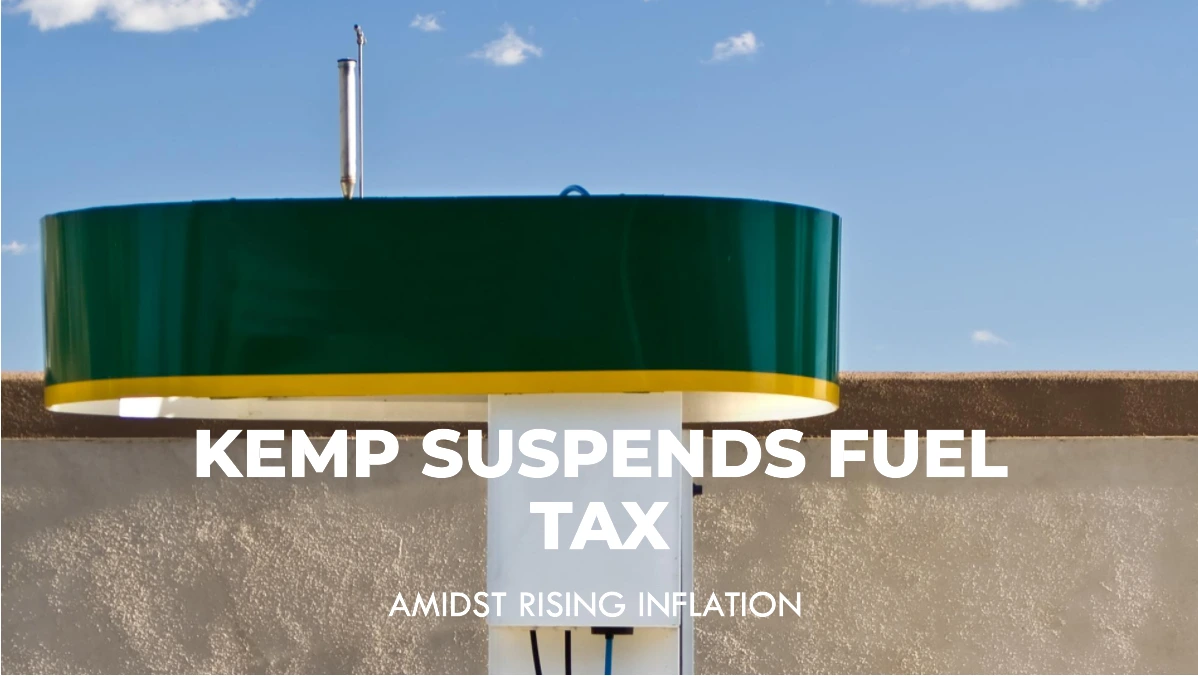In recent times, the global economy has been facing significant challenges, and the United States is no exception. One of the most pressing issues is inflation, which has been steadily rising, affecting the purchasing power of American citizens. To address this issue and provide relief to the people of Georgia, Governor Brian Kemp made a noteworthy decision—to suspend the state’s fuel tax. This move has generated both support and criticism, sparking a nationwide conversation about the impact of fuel taxes and their role in mitigating inflation.
| Pros | Cons |
| Immediate relief for consumers | Revenue loss for infrastructure projects |
| Potential to mitigate inflation | Sustainability concerns |
| Political advantage | Equity issues |
| Potential for increased fuel consumption |
The Context: Rising Inflation and Its Effects
Before delving into Governor Kemp’s decision to suspend the fuel tax, it’s crucial to understand the context—the alarming rise in inflation. Inflation refers to the increase in the prices of goods and services over time, resulting in the devaluation of a currency’s purchasing power. In the United States, inflation has been a growing concern, affecting various sectors of the economy.
The key factors contributing to inflation include:
- Supply Chain Disruptions: The COVID-19 pandemic disrupted global supply chains, leading to shortages and increased production costs.
- Increased Demand: As the economy reopens and consumer spending surges, demand for goods and services has outstripped supply.
- Government Spending: Extensive government spending, particularly during the pandemic, injected a significant amount of money into the economy.
- Rising Energy Prices: The cost of energy, including gasoline, has been on the rise, impacting overall consumer prices.
The Fuel Tax: A Double-Edged Sword
The fuel tax is a common source of revenue for state governments, used to fund transportation infrastructure projects such as road repairs and maintenance. This tax is typically levied on gasoline and diesel fuel purchases. While it serves as a vital revenue stream, it also directly affects consumers by increasing the cost of fuel.
Governor Brian Kemp’s decision to suspend the fuel tax is significant for several reasons:
- Immediate Relief: Suspending the fuel tax provides immediate relief to consumers who are grappling with the rising cost of gasoline. With prices at the pump hitting record highs, this decision eases the financial burden on Georgia residents.
- Addressing Inflation: By lowering the cost of fuel, Governor Kemp aims to combat inflationary pressures. Cheaper fuel can translate into lower transportation costs for goods and services, potentially reducing overall consumer prices.
- Political Implications: Governor Kemp’s decision carries political implications. As a Republican governor in a traditionally red state, his actions are closely scrutinized, especially in the lead-up to the next election. This move could help solidify his stance on addressing economic concerns.
However, the suspension of the fuel tax also raises questions and concerns:
- Revenue Loss: Georgia relies on fuel tax revenue to fund critical infrastructure projects. The suspension of this tax may lead to budget shortfalls and delays in necessary repairs and upgrades.
- Sustainability: Lowering the cost of fuel could encourage greater consumption, potentially undermining efforts to promote sustainability and reduce greenhouse gas emissions.
- Equity Issues: Fuel taxes are regressive, meaning they affect lower-income individuals more significantly. Suspending the tax benefits all consumers, but it may not address equity concerns.
The Public Reaction
Governor Kemp’s decision has generated mixed reactions from the public and political leaders:
- Supporters: Those in favor of the suspension of the fuel tax argue that it provides immediate relief to individuals and businesses struggling with the rising cost of living. They see it as a proactive step in addressing inflation.
- Critics: Critics are concerned about the revenue loss and its impact on infrastructure projects. They also worry about the potential for increased fuel consumption and its environmental consequences.
- Political Responses: The decision has political implications, with both Republicans and Democrats using it as an opportunity to advance their respective agendas. Republicans highlight it as an example of fiscally responsible governance, while Democrats emphasize the need for broader economic policies to address inflation.
The Broader Debate
Governor Kemp’s decision to suspend the fuel tax is part of a broader national debate about the role of government in addressing economic challenges. Inflation, supply chain disruptions, and energy costs are complex issues that require multifaceted solutions. While the suspension of the fuel tax provides short-term relief, it does not address the root causes of these economic challenges.
Many economists and policymakers advocate for a comprehensive approach to inflation that includes measures such as fiscal policies, supply chain resilience, and addressing workforce issues. These approaches aim to create sustainable, long-term solutions rather than short-term fixes.
| Pros | Cons |
| Comprehensive solutions to economic challenges | Complex and time-consuming |
| Focus on sustainability | Political challenges in implementation |
| Long-term impact | Requires bipartisan cooperation |
Conclusion
Governor Brian Kemp’s decision to suspend the fuel tax in Georgia is a significant policy move aimed at providing immediate relief to residents amidst rising inflation. However, it also raises questions about revenue loss, sustainability, and equity. While this decision may offer short-term benefits, addressing the root causes of inflation and economic challenges requires a more comprehensive and sustained approach.
As the nation grapples with inflation and its economic ramifications, policymakers and citizens alike must engage in thoughtful dialogue about the most effective strategies to ensure long-term economic stability and prosperity.
In the end, Governor Kemp’s decision serves as a reminder of the complexities of economic policy and the importance of considering both short-term relief and long-term sustainability in addressing the challenges facing our communities and our nation.
